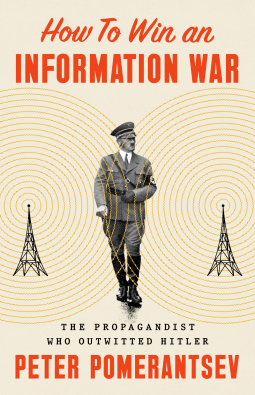
05 Jun Book Review of How to Win an Information War: The Propagandist Who Out…
Book Review: How to Win an Information War: The Propagandist Who Outwitted Hitler by Peter Pomerantsev
When I stumbled upon How to Win an Information War, I felt an immediate tug of curiosity; how could the historical tales of British anti-Nazi propaganda resonate with the current conflict in Ukraine? Peter Pomerantsev, a writer whose previous work, Nothing is True and Everything is Possible, had already captivated me with his piercing insights into Putin’s Russia, was poised to weave past and present together in a way that could illuminate our understanding of today’s information battles. I couldn’t help but wonder: in a world so riddled with misinformation, what lessons might we unearth from the struggles of the past?
Pomerantsev draws us into the life of Sefton Delmer, a man who, during World War II, spearheaded a bold campaign to counter Hitler’s overwhelming propaganda machine. This historical narrative is interspersed with lessons applicable to our modern landscape of alternative facts and conspiracy theories. What struck me most was Pomerantsev’s ability to thread together themes of identity, belonging, and the seductive nature of power. Delmer’s own bicultural background left him acutely aware of how propaganda fulfills deep-seated human needs for community and significance. It was astonishing to see how these insights still echo in today’s world, where misinformation often feeds our cravings for belonging and control.
Pomerantsev’s writing style is both engaging and scholarly, fostering a conversation that feels intimate yet intellectually rigorous. He brings to life Delmer’s ingenious tactics—like using a ‘pirate radio’ scheme to undermine Nazi morale—while simultaneously imparting critical analyses that challenge us to reconsider our own media consumption. The pacing ebbs and flows beautifully, always allowing moments for contemplation before moving on to the next ingenious stratagem.
Not long into the book, I encountered a particularly poignant moment when Pomerantsev writes about the need for media to not merely preach to the converted but to engage and reach out to those ensnared in the grip of propaganda. This resonated deeply with me, as it calls for a shift in how we approach the truth in our current polarized environment. His insightful assertion, "You can’t shove ‘the truth’ down people’s throats if they don’t want to hear it," lingered in my mind long after I closed the book. It underscored the need for empathy in communication—a vital lesson for our times.
How to Win an Information War is a crucial read not just for history buffs but for anyone grappling with the complexities of modern media. It invites us to reckon with the ongoing fight against authoritarian narratives and underscores the importance of connection in countering propaganda. I emerged from Pomerantsev’s work not only informed but inspired—a reminder that the truths we seek require both understanding and action.
I highly recommend this book to readers interested in media literacy, history, or political science. Its exploration of how we can better engage with our audiences in this turbulent information age felt particularly relevant. In an age where every click can veer towards echo chambers, Pomerantsev’s narrative serves as a vital roadmap for reclaiming truth—and reminds us that the fight against misinformation is ongoing and profoundly necessary.
Discover more about How to Win an Information War: The Propagandist Who Out… on GoodReads >>









